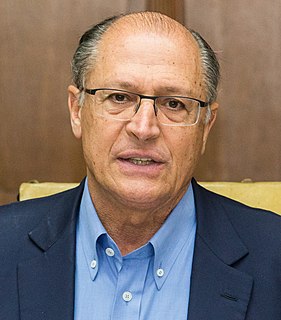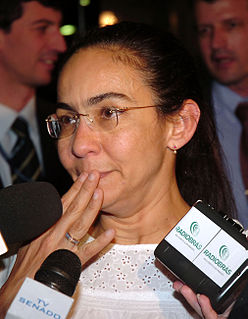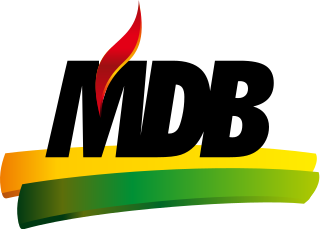
The Brazilian military government was the authoritarian military dictatorship that ruled Brazil from April 1, 1964 to March 15, 1985. It began with the 1964 coup d'état led by the Armed Forces against the administration of President João Goulart—who, having been vice-president, had assumed the office of president upon the resignation of the democratically elected president Jânio Quadros—and ended when José Sarney took office on March 15, 1985 as President. The military revolt was fomented by Magalhães Pinto, Adhemar de Barros, and Carlos Lacerda, Governors of Minas Gerais, São Paulo, and Guanabara. The coup was also supported by the Embassy and State Department of the United States.

João Baptista de Oliveira Figueiredo was a Brazilian military leader and politician who was the 30th President of Brazil, the last of the military regime that ruled the country following the 1964 coup d'état. He was chief of the Secret Service (SNI) during the term of his predecessor, Ernesto Geisel, who appointed him to the presidency at the end of his own mandate. He took the oath of office on March 15, 1979, serving until March 15, 1985.

Diretas Já was a civil unrest movement which, in 1984, demanded direct presidential elections in Brazil.
The Socialism and Liberty Party is a Brazilian political party with 147,096 active members. PSOL is a left-wing to far-left party which is self-described as socialist and democratic.

José Serra is a Brazilian politician who has served as a Congressman, Senator, Minister of Planning, Minister of Health, Mayor of São Paulo, Governor of São Paulo state, and Minister of Foreign Affairs of Brazil.
Folha de S.Paulo, also known as Folha de São Paulo, or simply Folha, is a Brazilian daily newspaper founded in 1921 under the name Folha da Noite and published in São Paulo by the Folha da Manhã company.

The Brazilian Socialist Party is a political party in Brazil. It was founded in 1947, before being abolished by the military regime in 1965 and re-organised in 1985 with the re-democratisation of Brazil. It elected six Governors in 2010, becoming the second largest party in number of state governments, behind only PSDB. In addition to that, it won 34 seats in the Chamber of Deputies and three seats in the Senate, besides having been a member of the For Brazil to Keep on Changing coalition, which elected Dilma Rousseff as President of Brazil.

Geraldo José Rodrigues de Alckmin Filho is a Brazilian politician who served as the Governor of São Paulo from 2001 to 2006, and then again from 2011 to 2018. He was the Brazilian Social Democracy Party (PSDB) presidential nominee for the 2018 presidential election. He is usually described by political analysts and supporters as a pro-business centrist, closely associated with the political and financial establishment.

Heloísa Helena Lima de Moraes Carvalho is a Brazilian nurse, schoolteacher, and politician, member of the political party Rede Sustentabilidade. She is the Brazilian woman to have received the third highest voting in a presidential race, ranking behind Marina Silva and Dilma Rousseff in 2010.

Orestes Quércia was a Brazilian politician. He was the 28th governor of São Paulo State.

Presidential elections were held in Brazil on 15 January 1985, the last to be held indirectly through an electoral college, and the last to be held under the military regime. The electoral college system was put in place so that the military elite that controlled the government could secure the election of the candidate chosen by the High Command of the Armed Forces as President. However, in 1985, due to the process of negotiated transition to democracy that started in the late 1970s, the politicians in the electoral college were placed under no coercion, and were allowed to choose the president of their choice.

Alberto Goldman is a Brazilian engineer and politician. He was elected Vice Governor of São Paulo in 2006 with Governor José Serra. After Serra's resignation, Goldman became governor of São Paulo on 6 April 2010.

Fernando Haddad is a Brazilian academic and politician who served as Mayor of São Paulo from 2013 to 2017. He was the Workers' Party candidate for President of Brazil in the 2018 election, replacing former President Luiz Inácio Lula da Silva, whose candidacy was barred by the Superior Electoral Court under the Clean Slate law. Haddad faced Jair Bolsonaro in the run-off of the election, and lost the election with 44.87% of the votes against the 55.13% of Bolsonaro.

The Brazilian presidential election was held in 1978 through a electoral college system. The opposition's party, the Brazilian Democratic Movement (MDB), chose an anti-candidate to fill the spot and denounce the restrict democracy. The MDB chose General Euler Bentes Monteiro to run the elections against João Figueiredo from the National Renewal Alliance Party. João Figueiredo won with 355 electoral votes against 226 votes for Euler Monteiro.

Indirect presidential elections were held in Brazil on 25 October 1969. The elections were the third held under the Brazilian military government, and used an electoral college system.

Indirect presidential elections were held in Brazil on 3 October 1966 through an electoral college system. It was the second election during the Brazilian military government, with Artur da Costa e Silva as the sole candidate. Costa e Silva was elected with 295 votes from the ruling National Renewal Alliance Party (ARENA).

General elections were held in Brazil on 7 October 2018 to elect the President, Vice President and the National Congress. Elections for state governors and vice governors, state legislative assemblies and the Legislative Chamber of the Federal District were held at the same time.




















